Linux网络编程--select()和pselect()函数
linux-dash
A beautiful web dashboard for Linux
项目地址:https://gitcode.com/gh_mirrors/li/linux-dash
·
函数select()和pselect()用于IO复用,它们监视多个文件描述符的集合,判断是否有符合条件的时间发生。
1.select()函数
函数select()与之前的recv()和send()直接操作文件描述符不同。使用select()函数可以先对需要操作的文件描述符进行查询,查看是否目标文件描述符可以进行读、写或者错误操作,然后当文件描述符满足操作的条件的时候才进行真正的IO操作。
select()函数原型以及解释说明如下:
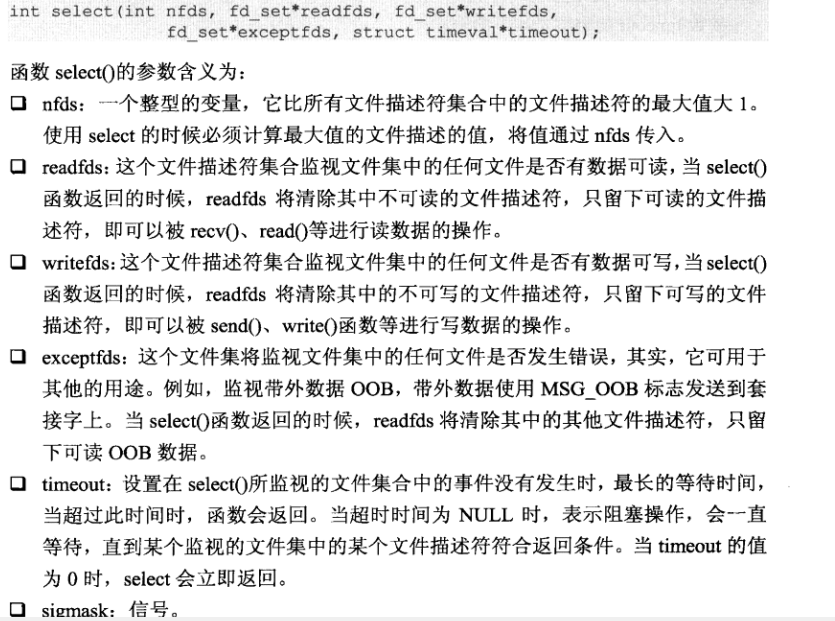
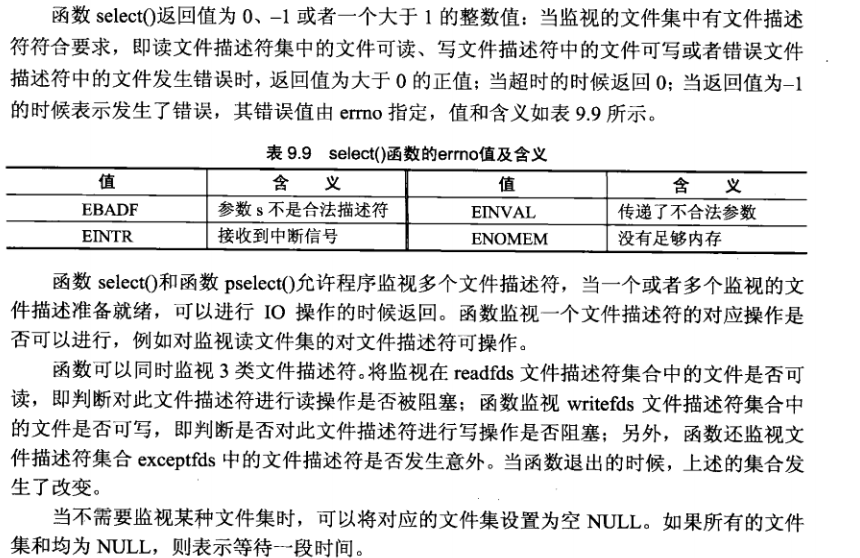
select()函数例子:
使用select函数监视标准输入是否有数据处理,设置超时时间为5s。
#include<unistd.h>
#include<sys/time.h>
#include<sys/types.h>
int main(){
fd_set rd;//定义fd_set类型的读描述符集合
struct timeval tv;//timeval 结构
int retval;//select返回值
FD_ZERO(&rd);//清空读描述符集合
FD_SET(0,&rd);//将描述符标准输入0放入读描述符集合中
tv.tv_sec=5;
tv.tv_usec=0;//设置超时间为5S,select函数调用返回的时候会修改timeval的值为剩余的时间。
retval=select(2,&rd,NULL,NULL,&tv);//调用select函数监听标准输入,fd最大描述符个数加1(这里只监听标准输入一个描述符,那么这个值就是1+1,也就是2)
// printf("[tv.tv_sec:%d]\n",tv.tv_sec);
if(retval==-1){
perror("select");
}
else if(retval){
printf("Data is avaialble now\n");
}
else{
printf("NO Data within five seconds\n");
}
return 0;
}2.pselect()函数
函数select()是用一种超时轮循的方式来查看文件的读写错误可操作性。在Linux下,还有一个相似的函数pselect()。
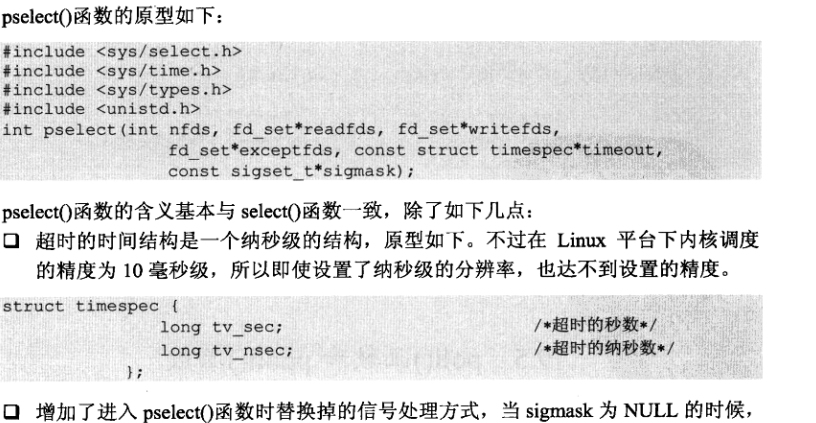
pselect()函数例子:
#include<unistd.h>
#include<sys/time.h>
#include<sys/types.h>
#include <signal.h>
int sigint_event=0;
void sigint_sig_handler(int s){//设置信号处理函数
sigint_event++;
signal(SIGINT,sigint_sig_handler);
}
int main(){
int r;
fd_set rd;
sigset_t sigmask,orignal_sigmask;//设置新掩码和保存原始掩码
FD_ZERO(&rd);//清空读描述符集合
FD_SET(0,&rd);//将标准输入放入读描述符集合
sigemptyset(&sigmask);//清空信号
sigaddset(&sigmask,SIGINT);//将SIGINT信号加入sigmask中
//设置信号SIG_BLOCK的掩码sigmask,并将原始的掩码保存在orignal_sigmask中
sigprocmask(SIG_BLOCK,&sigmask,&orignal_sigmask);
signal(SIGINT,sigint_sig_handler);//挂接信号处理函数
for(;;){
for(;sigint_event>0;sigint_event--){
printf("sigint_event[%d]\n",sigint_event);
} r=pselect(1,&rd,NULL,NULL,NULL,&orignal_sigmask);//pselect函数IO复用
if(r==-1){
perror("pselect");
}
else if(r){
printf("Data is avaialble now\n");
}
else{
printf("NO Data within five seconds\n");
}
sleep(1);
}
return 0;
}最后介绍重量级select()函数例子:
/* select使用的例子 */
#include <stdlib.h>
#include <stdio.h>
#include <unistd.h>
#include <sys/time.h>
#include <sys/types.h>
#include <string.h>
#include <signal.h>
#include <sys/socket.h>
#include <netinet/in.h>
#include <arpa/inet.h>
#include <errno.h>
static int forward_port;
#undef max
#define max(x,y) ((x) > (y) ? (x) : (y))
static int listen_socket (int listen_port) {
struct sockaddr_in a;
int s;
int yes;
if ((s = socket (AF_INET, SOCK_STREAM, 0)) < 0) {
perror ("socket");
return -1;
}
yes = 1;
if (setsockopt
(s, SOL_SOCKET, SO_REUSEADDR,
(char *) &yes, sizeof (yes)) < 0) {
perror ("setsockopt");
close (s);
return -1;
}
memset (&a, 0, sizeof (a));
a.sin_port = htons (listen_port);
a.sin_family = AF_INET;
if (bind
(s, (struct sockaddr *) &a, sizeof (a)) < 0) {
perror ("bind");
close (s);
return -1;
}
printf ("accepting connections on port %d\n",
(int) listen_port);
listen (s, 10);
return s;
}
static int connect_socket (int connect_port,
char *address) {
struct sockaddr_in a;
int s;
if ((s = socket (AF_INET, SOCK_STREAM, 0)) < 0) {
perror ("socket");
close (s);
return -1;
}
memset (&a, 0, sizeof (a));
a.sin_port = htons (connect_port);
a.sin_family = AF_INET;
if (!inet_aton
(address,
(struct in_addr *) &a.sin_addr.s_addr)) {
perror ("bad IP address format");
close (s);
return -1;
}
if (connect
(s, (struct sockaddr *) &a,
sizeof (a)) < 0) {
perror ("connect()");
shutdown (s, SHUT_RDWR);
close (s);
return -1;
}
return s;
}
#define SHUT_FD1 { \
if (fd1 >= 0) { \
shutdown (fd1, SHUT_RDWR); \
close (fd1); \
fd1 = -1; \
} \
}
#define SHUT_FD2 { \
if (fd2 >= 0) { \
shutdown (fd2, SHUT_RDWR); \
close (fd2); \
fd2 = -1; \
} \
}
/* 缓冲区的大小为1024 */
#define BUF_SIZE 1024
int main (int argc, char **argv) {
int h;
int fd1 = -1, fd2 = -1;
char buf1[BUF_SIZE], buf2[BUF_SIZE];
int buf1_avail, buf1_written;
int buf2_avail, buf2_written;
if (argc != 4) {
fprintf (stderr,
"Usage\n\tfwd <listen-port> \
<forward-to-port> <forward-to-ip-address>\n");
exit (1);
}
signal (SIGPIPE, SIG_IGN);
forward_port = atoi (argv[2]);
h = listen_socket (atoi (argv[1]));
if (h < 0)
exit (1);
/* 主循环 */
for (;;) {
int r, nfds = 0;
fd_set rd, wr, er; /*定义用于读、写和错误的文件集*/
FD_ZERO (&rd); /*清空读文件集描述符和*/
FD_ZERO (&wr); /*清空写文件描述符集和*/
FD_ZERO (&er); /*清空错误文件描述符集和*/
FD_SET (h, &rd); /*将服务器的侦听套接字放入可读文件描述符集合*/
nfds = max (nfds, h);
if (fd1 > 0 && buf1_avail < BUF_SIZE) {
FD_SET (fd1, &rd);
nfds = max (nfds, fd1);
}
if (fd2 > 0 && buf2_avail < BUF_SIZE) {
FD_SET (fd2, &rd);
nfds = max (nfds, fd2);
}
if (fd1 > 0
&& buf2_avail - buf2_written > 0) {
FD_SET (fd1, &wr);
nfds = max (nfds, fd1);
}
if (fd2 > 0
&& buf1_avail - buf1_written > 0) {
FD_SET (fd2, &wr);
nfds = max (nfds, fd2);
}
if (fd1 > 0) {
FD_SET (fd1, &er);
nfds = max (nfds, fd1);
}
if (fd2 > 0) {
FD_SET (fd2, &er);
nfds = max (nfds, fd2);
}
r = select (nfds + 1, &rd, &wr, &er, NULL);
if (r == -1 && errno == EINTR)
continue;
if (r < 0) {
perror ("select()");
exit (1);
}
if (FD_ISSET (h, &rd)) {
unsigned int l;
struct sockaddr_in client_address;
memset (&client_address, 0, l =
sizeof (client_address));
r = accept (h, (struct sockaddr *)
&client_address, &l);
if (r < 0) {
perror ("accept()");
} else {
SHUT_FD1;
SHUT_FD2;
buf1_avail = buf1_written = 0;
buf2_avail = buf2_written = 0;
fd1 = r;
fd2 =
connect_socket (forward_port,
argv[3]);
if (fd2 < 0) {
SHUT_FD1;
} else
printf ("connect from %s\n",
inet_ntoa
(client_address.sin_addr));
}
}
/* NB: read oob data before normal reads */
if (fd1 > 0)
if (FD_ISSET (fd1, &er)) {
char c;
errno = 0;
r = recv (fd1, &c, 1, MSG_OOB);
if (r < 1) {
SHUT_FD1;
} else
send (fd2, &c, 1, MSG_OOB);
}
if (fd2 > 0)
if (FD_ISSET (fd2, &er)) {
char c;
errno = 0;
r = recv (fd2, &c, 1, MSG_OOB);
if (r < 1) {
SHUT_FD1;
} else
send (fd1, &c, 1, MSG_OOB);
}
if (fd1 > 0)
if (FD_ISSET (fd1, &rd)) {
r =
read (fd1, buf1 + buf1_avail,
BUF_SIZE - buf1_avail);
if (r < 1) {
SHUT_FD1;
} else
buf1_avail += r;
}
if (fd2 > 0)
if (FD_ISSET (fd2, &rd)) {
r =
read (fd2, buf2 + buf2_avail,
BUF_SIZE - buf2_avail);
if (r < 1) {
SHUT_FD2;
} else
buf2_avail += r;
}
if (fd1 > 0)
if (FD_ISSET (fd1, &wr)) {
r =
write (fd1,
buf2 + buf2_written,
buf2_avail -
buf2_written);
if (r < 1) {
SHUT_FD1;
} else
buf2_written += r;
}
if (fd2 > 0)
if (FD_ISSET (fd2, &wr)) {
r =
write (fd2,
buf1 + buf1_written,
buf1_avail -
buf1_written);
if (r < 1) {
SHUT_FD2;
} else
buf1_written += r;
}
/* check if write data has caught read data */
if (buf1_written == buf1_avail)
buf1_written = buf1_avail = 0;
if (buf2_written == buf2_avail)
buf2_written = buf2_avail = 0;
/* one side has closed the connection, keep
writing to the other side until empty */
if (fd1 < 0
&& buf1_avail - buf1_written == 0) {
SHUT_FD2;
}
if (fd2 < 0
&& buf2_avail - buf2_written == 0) {
SHUT_FD1;
}
}
return 0;
}
A beautiful web dashboard for Linux
最近提交(Master分支:2 个月前 )
186a802e
added ecosystem file for PM2 4 年前
5def40a3
Add host customization support for the NodeJS version 4 年前
更多推荐
 已为社区贡献5条内容
已为社区贡献5条内容

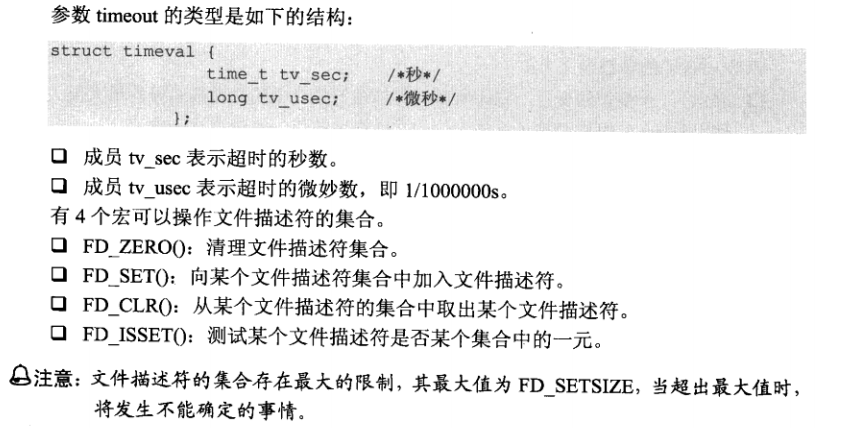
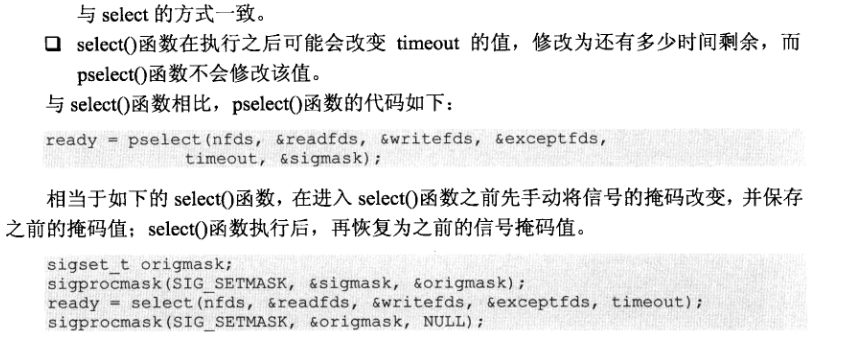






所有评论(0)